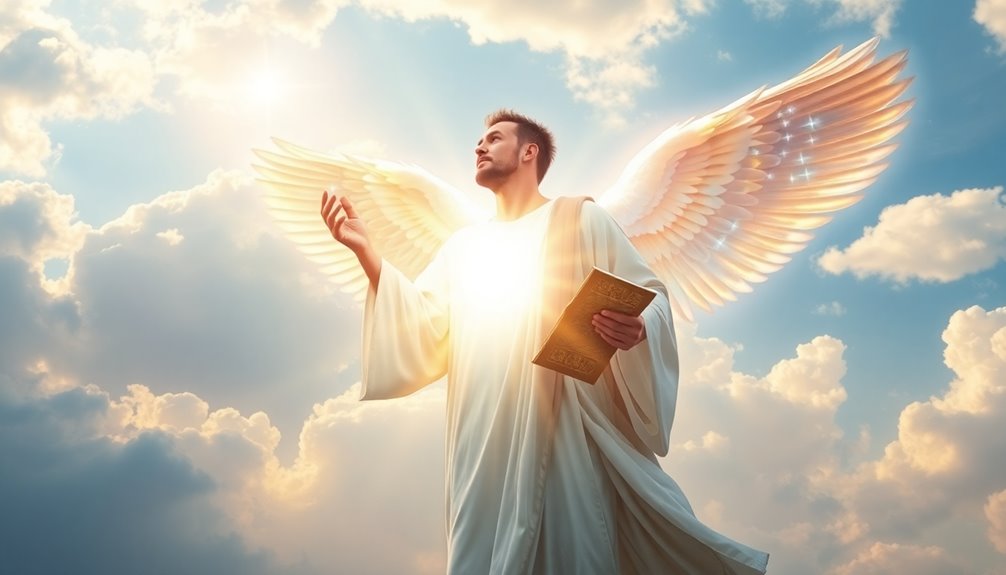Gabriel is a significant angel in the Bible, recognized primarily as a messenger from God. You first meet him in the Book of Daniel, where he explains prophetic visions. He later announces the births of both John the Baptist and Jesus, emphasizing divine intervention and hope. In Jewish tradition, Gabriel is seen as a chief angel alongside Michael, and his role extends to various cultural interpretations. His messages encourage faith and clarity during uncertain times. If you're curious about his deeper significance and continued influence, there's much more to uncover about this remarkable figure.
Key Takeaways
- Gabriel is a prominent angelic messenger in the Bible, first appearing in the Book of Daniel to explain visions.
- He announces significant events, such as the births of John the Baptist and Jesus, emphasizing divine intervention.
- Gabriel interprets prophecies, linking Old Testament messages to their New Testament fulfillments, particularly regarding the Messiah.
- In Judaism, he is considered a chief angel associated with divine judgment and prophetic roles, recognized in both scripture and Talmudic literature.
- His cultural impact extends beyond Christianity, influencing literature, art, and being recognized in Islam as Jibril, the messenger of the Quran.
Introduction

Gabriel is one of the most intriguing figures in the Bible, known for his pivotal role as a messenger of God. His name, which means "God is my strength," reflects the significant purpose he serves throughout scripture.
You'll find him first in the Hebrew Bible, particularly in the Book of Daniel, where he explains complex visions to the prophet Daniel. This establishes Gabriel as a key figure in divine communication.
In the New Testament, Gabriel's role becomes even more prominent. He's the angel who announces the miraculous births of John the Baptist to Zechariah and Jesus to Mary during the Annunciation. These moments highlight Gabriel's importance not just as a messenger but as a herald of new beginnings and significant events in biblical history.
While the Bible doesn't explicitly call Gabriel an archangel, tradition often bestows this title upon him due to his vital contributions. His appearances emphasize themes of divine intervention and the importance of listening to God's word.
Gabriel's influence continues to resonate, reminding you of the power of faith and the miraculous nature of birth.
Gabriel's Role in Prophecy

Gabriel's role in prophecy is pivotal, as he first appears in the Book of Daniel, interpreting visions that point to the Anointed One.
You'll see him again in the New Testament, where he announces the births of John the Baptist and Jesus, connecting Old Testament prophecies with their fulfillment.
Let's explore both primary and secondary Bible references that highlight Gabriel's significance as a divine messenger.
Primary Bible References
Although often seen as a messenger, Gabriel plays a crucial role in biblical prophecy, serving as a divine link between God's promises and their fulfillment. He first appears in the Bible in Daniel 8:16, where he's tasked with explaining a vision to the prophet Daniel. This initial encounter establishes Gabriel as an angel committed to delivering God's prophetic messages.
In Daniel 9:21, Gabriel returns to provide insight on the seventy weeks prophecy, further solidifying his significance in biblical prophecy. His role expands in the New Testament when he announces the birth of John the Baptist to Zechariah in Luke 1:13, confirming that Elizabeth's prayers have been answered and prophesying John's future impact.
During the Annunciation in Luke 1:26-38, Gabriel delivers a pivotal message to Mary about the virgin birth of Jesus, detailing the miraculous conception through the Holy Spirit.
Through these key Bible references, Gabriel's messages emphasize the fulfillment of God's promises and the divine plan for salvation, bridging the gap between Old Testament prophecies and New Testament events. Gabriel's role as an angel is essential to understanding the continuity of God's redemptive work.
Secondary Bible References
Frequently referenced in discussions of biblical prophecy, the angel Gabriel serves as a pivotal figure connecting key events across both the Old and New Testaments. He first appears in the Book of Daniel, where he clarifies prophetic visions concerning Israel's future (Daniel 8:16; 9:21-27). Gabriel announces the timeline for the arrival of the Anointed One, emphasizing the prophecy of the Messiah in Daniel 9:25-26.
In the New Testament, Gabriel's role expands significantly. He delivers the important news of John the Baptist's impending birth to Zechariah, outlining John's future mission to prepare the way for Jesus (Luke 1:13-17). This moment marks a crucial link between the prophetic messages of the Old Testament and their New Testament fulfillment.
Gabriel's most notable announcement comes when he conveys the miraculous news of Jesus' virgin birth to Mary (Luke 1:26-38). He details Jesus' future greatness and divine lineage, reinforcing the significance of his role as God's messenger.
Through these interactions, Gabriel bridges the gap between prophecy and fulfillment, highlighting divine intervention in salvation history.
Gabriel's Role in Ancient Texts

Within the pages of ancient texts, Gabriel emerges as a significant figure, first appearing in the Book of Daniel. In Daniel 8:16, he's tasked with explaining Daniel's visions and prophecies, showcasing his role as a divine messenger. Gabriel returns in Daniel 9:21-22, where he provides insight into the prophecy about the Anointed One, linking his message to messianic expectations. This establishes Gabriel not just as an angel, but as a pivotal character in the unfolding narrative of hope and redemption.
Moreover, the Talmud and other rabbinic writings identify Gabriel as the angel associated with the destruction of Jerusalem, underscoring his complex role in Jewish thought. His presence evokes fear and awe, indicating the weight of the messages he delivers.
Gabriel's influence extends into the New Testament, where he announces the births of John the Baptist and Jesus, further solidifying his position as a prominent angelic figure. Through these encounters, you see how Gabriel embodies both the promise of salvation and the consequences of divine judgment, making his role in ancient texts truly multifaceted.
Gabriel's Significance in Judaism

Gabriel holds a significant place in Jewish thought, recognized as a key figure in the Hebrew Bible, particularly in the Book of Daniel. As a divine messenger, he plays a vital role in explaining visions and prophecies, especially in chapters 8 and 9.
In Jewish tradition, Gabriel is viewed as one of the chief angels, standing alongside Michael and often associated with the protection of Israel.
Rabbinic Judaism identifies Gabriel with the "man in linen" from Ezekiel, linking him to important prophetic roles. This connection emphasizes his influence in conveying divine messages and judgments.
Talmudic interpretations even suggest that Gabriel was involved in the destruction of Jerusalem, showcasing his link to divine judgment and the complexities of his role in Jewish eschatology.
In mystical Judaism, Gabriel's significance expands further as he's associated with the sefirah of Yesod in Kabbalah. Here, he represents a channel of divine influence and communication, illustrating how integral he's to the understanding of God's will.
Gabriel's Gender Identity Debated

When you think about Gabriel, you might picture a male figure based on traditional interpretations, but is that view too narrow?
Some argue that angels, including Gabriel, mightn't fit into human gender categories, challenging cultural assumptions.
It's worth exploring how these perspectives shape our understanding of Gabriel's identity in the biblical narrative.
Debunk Gabriel's Gender Assumptions
How do we reconcile the traditional portrayal of Gabriel as a male figure with the broader implications of gender identity in religious texts? Gabriel, often depicted in a masculine role, has a name meaning "God is my strength" in Hebrew, which reinforces this view.
However, the Bible doesn't explicitly assign gender to angels, leaving room for interpretation. This absence of detailed physical descriptions allows you to question the necessity of applying human gender constructs to celestial beings.
The portrayal of Gabriel as male may reflect cultural contexts that associate divine messengers with masculine traits, yet this assumption isn't universally accepted. Some modern theologians argue for a non-binary interpretation of angels, suggesting that gender may be a human construct irrelevant to beings like Gabriel.
This perspective challenges traditional assumptions and encourages a more nuanced understanding of gender identity in religious texts.
In this light, it's essential to recognize that the debate around Gabriel's gender reflects broader discussions about gender identity. By considering these diverse viewpoints, you can appreciate the complexity of Gabriel's identity beyond mere gender assumptions.
Cultural Interpretations of Gabriel
While traditional portrayals often depict Gabriel as a male figure, cultural interpretations reveal a more complex landscape regarding gender identity. In both Jewish and Christian traditions, Gabriel is referred to using masculine pronouns, and his Hebrew name translates to "God is my strength," incorporating elements of masculine identity. Artistic representations throughout history have further cemented this view, often illustrating Gabriel as a male angel.
However, modern discussions challenge these binary classifications. Some argue that as a spiritual being, Gabriel transcends conventional gender identities, prompting a reevaluation of how we perceive angels. This perspective opens up a dialogue about the nature of divine entities and their representation in religious and cultural contexts.
The debate surrounding Gabriel's gender identity reflects broader conversations about gender itself. It invites you to question the assumptions tied to masculinity and femininity, especially in spiritual realms.
By exploring these cultural interpretations, you can appreciate that the identity of figures like Gabriel may not fit neatly into traditional categories, highlighting the complexities of gender in both earthly and divine narratives.
Ultimately, these discussions enrich your understanding of Gabriel beyond the confines of masculine identity.
Faith-Based Community Outreach

When you think about community outreach, consider how Gabriel's role as a messenger can guide your decision-making.
His examples of offering hope and support can inspire you to create a strong network of community support.
Angel's Guidance in Decision-Making
What role does divine guidance play in your decision-making, especially within faith-based community outreach? When faced with critical choices, turning to divine messengers like Gabriel can provide clarity and reassurance. Gabriel, known for delivering crucial messages in the Bible, exemplifies the importance of seeking divine guidance. His encounters often remind you to "not be afraid," alleviating the fear and uncertainty that can cloud your judgment.
In moments where you need direction, Gabriel's role in explaining visions to Daniel demonstrates the significance of understanding complex spiritual dilemmas. By engaging in prayer and remaining receptive to divine messaging, you can find the clarity needed to make informed choices.
Gabriel stands in the presence of God, emphasizing the authority behind his guidance, which can inspire confidence in your outreach initiatives. Utilizing Gabriel's example, you can enhance your decision-making process by embracing spiritual discernment.
This approach not only strengthens your faith but also aligns your outreach efforts with divine intentions, ensuring that your actions resonate within the community. Trust in the divine guidance offered through messengers like Gabriel, and you'll find that your decisions can lead to impactful and meaningful outreach.
Community Support Through Gabriel's Guidance
Throughout biblical history, Gabriel's role as a divine messenger has provided essential support and encouragement for faith-based communities. His announcements to Zechariah and Mary illustrate how vital communication and guidance are within these groups. When you reflect on Gabriel's reassuring presence, it can inspire your community outreach initiatives. His divine messages remind you to trust in God's plans and fulfill your unique purposes.
By engaging in prayer and being responsive to God's call, as demonstrated through Gabriel's encounters, you can promote community engagement. These spiritual practices create strong support systems that empower individuals to share their faith. Additionally, Gabriel's example emphasizes the importance of sharing divine messages and prophecies, reinforcing the need for robust communication channels in your faith community.
Encounters with Gabriel during critical moments in biblical history encourage you to actively participate in outreach efforts. This participation fosters unity and a shared mission to fulfill God's will in your community. Embracing Gabriel's guidance not only strengthens individual faith but also enhances collective efforts, creating a vibrant, supportive environment where everyone can thrive together.
Gabriel's Enduring Cultural Impact

Gabriel's impact on culture and religion is profound and far-reaching, influencing countless artistic and literary works. Recognized across various cultures, Gabriel serves as a prominent figure of divine communication. This role has inspired artists, especially during the Renaissance, who frequently depicted him in scenes like the Annunciation, emphasizing his cultural significance.
In literary traditions, Gabriel's messages, such as the announcements of John the Baptist and Jesus' birth, symbolize hope and divine intervention. His ability to bridge human and divine realms resonates deeply, making him a vital character in theological discussions.
In Islam, Gabriel (Jibril) is revered as the messenger who conveyed the Quran to Muhammad, showcasing his importance across different faiths. This interfaith recognition enhances his cultural significance, allowing for rich dialogues between Jewish and Christian narratives, where Gabriel appears in both the Old and New Testaments.
Through these diverse portrayals, Gabriel continues to inspire modern interpretations in art, literature, and religious discourse, solidifying his status as a lasting symbol of divine communication and hope in humanity's spiritual journey.
Additional Resources

For those interested in exploring Gabriel's significance further, a wealth of resources is available that delve into his biblical narratives and cultural impact. You can start by reading the Book of Daniel, where Gabriel first appears, explaining visions to the prophet (Daniel 8:16, 9:21). This text sets the stage for Gabriel's role as a divine messenger in the Bible.
In the New Testament, Gabriel's appearances to Zechariah and Mary (Luke 1:11-38) highlight his importance in announcing pivotal moments in Christian history, including the birth of John the Baptist and Jesus. Numerous commentaries and theological texts analyze these passages, offering insights into his character and significance as an archangel, despite the Bible not explicitly labeling him as such.
You might also explore works on angelology, which discuss Gabriel's characteristics and his role in both Jewish and Christian traditions.
Online platforms, such as Bible study websites and scholarly articles, provide further context and interpretations. By diving into these resources, you'll gain a deeper understanding of Gabriel's profound role as a divine messenger throughout history.
Frequently Asked Questions
What Is Gabriel Known for in the Bible?
Gabriel's known for being a powerful messenger in the Bible. You see him delivering important news, like announcing John the Baptist's birth and the virgin birth of Jesus.
When he appears, he often reassures those he visits, saying, "Do not be afraid." His role emphasizes hope and divine intervention, making him a significant figure in both the Old and New Testaments.
You can appreciate his importance in biblical narratives and angelology.
Is Gabriel Lucifer's Brother?
You might wonder if Gabriel is Lucifer's brother, but the Bible doesn't directly support that idea.
Both are distinct archangels with separate roles and narratives. While Lucifer represents rebellion and pride, Gabriel is known as a faithful messenger of God.
The concept of them being siblings comes more from theological interpretations than scripture.
Who Was Gabriel the Angel to God?
Gabriel's an angel known for his powerful role as a divine messenger.
You might think of him as the one who delivers important news, like announcing the births of key figures.
He's often associated with God's strength and authority, reflecting his close relationship with the divine.
When you consider his purpose, it's clear that Gabriel serves as a vital link between God and humanity, sharing messages of hope and guidance.
What Does the Bible Say About the Angel Gabriel?
The Bible describes Gabriel as a significant angelic figure with a divine role.
You'll find him delivering crucial messages to key individuals, like announcing John the Baptist's birth and the virgin birth of Jesus.
His appearances convey both comfort and awe, often reassuring those he visits with phrases like "Do not be afraid."
As one of the few named angels, he stands in God's presence, emphasizing his importance as a messenger.










